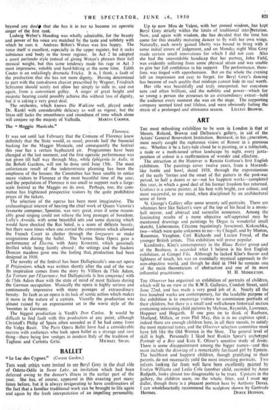The Maggio Musicale."
Florence. IT was not until last February that the Comune of Florence knew definitely that the State would, as usual, provide half the financial backing for the Maggio Musicale, and consequently the festival this year has a certain haphazard air. Programmes have been changed at the last moment, and the first operatic performance was not given till half way through May, while 1phigenia in Aulis, in the Boboli Gardens, will not be done until June 15th. The most unfortunate result of the indeterminate planning has been the emptiness of the houses; the Committee has been unable to entice many visitors to Florence at the most beautiful time of the year, and the population of Florence is too small to support such a large- scale festival as the Maggio on its own. Perhaps, too, the com- mittee has frightened prospective visitors by the quite prohibitive prices of the tickets.
The selection of the operas has been most imaginative. The archaeological interest of hearing the chief work of Queen Victoria's favourite composer, Spontini, was very great, even if some reason- ably good singing could not relieve the long passages of boredom. Lully's Armida, with some beautiful sets and some dancing which would have shocked the Roi Soleil, is a score of delicate beauty, but there were times when one envied the convention which allowed the French Court to chatter through the longueurs or make assignations during the ballet. The Vienna State Opera gave a performance of Electra, with Anny Konetzni, which genuinely thrilled while being faintly absurd ; the settings and the Isadora Duncan maidens gave one the feeling that production had been designed in 1910.
The novelty of the festival has been Dallapiccola's one-act opera II Prigioniero, which was written shortly after the end of the war. Its inspiration comes from the story by Villiers de !Isle Adam, La Torture par l'Esperance, but Dallapiccola is less concerned with de l'Isle Adam than with the state of mind of most Italians during the German occupation. Musically the opera is highly serious and continuously impressive with many passages of extraordinary beauty. Its fault as an opera is its lack of scenic action which makes it more in the nature of a cantata. Visually the production was almost ruined by an expressionist set in the worst style of the 'twenties in Germany. The biggest production is Verdi's Don Carlos. It would be difficult to find fault with this production at any point, although Christoff's Philip of Spain often sounded as if he had come from the Volga Basin. The Paris Opera Ballet have had a considerable success with audiences who look upon ballet as a strange and rare thing—there being few vestiges in modern Italy of the tradition of




































 Previous page
Previous page